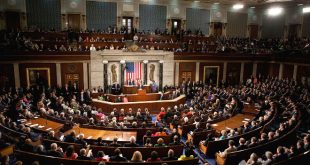 President Barack Obama is doing anything but closing out his lame duck term quietly. On the contrary he’s doing yet another end run around both the U.S. Congress and all 50 states that would impose another mandate that will cost money and jobs, possibly forcing states to raise taxes as well.
President Barack Obama is doing anything but closing out his lame duck term quietly. On the contrary he’s doing yet another end run around both the U.S. Congress and all 50 states that would impose another mandate that will cost money and jobs, possibly forcing states to raise taxes as well.
Twenty-one states have filed a federal lawsuit in U.S. District Court in Sherman, Texas, to stop him. Hours after the states filed their lawsuit, the U.S. Chamber of Commerce and other business groups filed a similar lawsuit with the same federal court.
Obama’s new mandate would force employers in all states to pay overtime to certain state employees. These employees include “bona fide executive, administrative, or professional” workers as they are not covered by the federal law that requires states to pay overtime for work performed beyond 40 hours in a week. The mandate applies to both private and public sector employers.
On the surface this sounds somewhat sensible. Why shouldn’t any state worker – or private sector worker contracted by the state – be eligible for overtime if they work more than 40 hours in a week? One reason why this hasn’t happened yet is that many states are strapped just trying to balance their current budgets. Mr. Obama’s lack of hope and change, much less his promised economic recovery, hasn’t helped.
The law says it should be up to the individual states first to decide if, and when, they should make such a change. Then they can ask Congress to change the law, and it’s up to Congress to have the final say.
This action by the Obama administration violates the Fair Labor Standards Act – only Congress has the power to establish a federal hourly minimum wage. It also violates the Constitution as it forces states to pay their workers higher wages at the expense of state budgets, services and governmental programs.
Obama actually put this in motion a couple of years ago, when he told his Labor Department to change this exception for “white collar” state employees. The department has now raised the minimum salary cutoff for overtime by more than double. The new rule also forces states to raise that cutoff even higher every three years.
As of now, starting December 1, 2016, all state employees will be entitled to overtime if they earn up to $913 per week regardless of whether they have “executive, administrative, or professional” responsibilities.
State government estimates peg the number of workers impacted at a minimum of 500 and reaching into the thousands, per state. Iowa projects its budget hit to be over $19 million, other states likely a lot more.
States such as Nevada – dependent on its tourism industry – would be hit very hard. According to the National Federation of Independent Businesses nearly half of all small businesses in Nevada employ at least one person who’d be affected by this new rule.
Not coincidentally, Nevada – through its Attorney General Adam Laxalt – is the lead plaintiff in this lawsuit. In filing the suit, Laxalt said: “This rule, pushed by distant bureaucrats in D.C., tramples on state and local government budgets, forcing states to shift money from other important programs to balance their budgets, including programs intended to protect the very families that purportedly benefit from such federal overreach.”
“Federal overreach” is already one of Obama’s legacies as he prepares to leave office. The courts have reined him in before, and hopefully will do so again.
Photo credit: U.S. Embassy The Hague (Creative Commons) – Some rights reserved
 Ken Blackwell is the former mayor of Cincinnati, Treasurer and Secretary of State for Ohio, undersecretary at the U.S. Department of Housing and Urban Development, and U.S. Ambassador to the United Nations Human Rights Commission.
Ken Blackwell is the former mayor of Cincinnati, Treasurer and Secretary of State for Ohio, undersecretary at the U.S. Department of Housing and Urban Development, and U.S. Ambassador to the United Nations Human Rights Commission.
The views expressed in opinion articles are solely those of the author and are not necessarily either shared or endorsed by Black Community News.
 CURE News and Clergy Blog News and Commentary for Christians
CURE News and Clergy Blog News and Commentary for Christians



